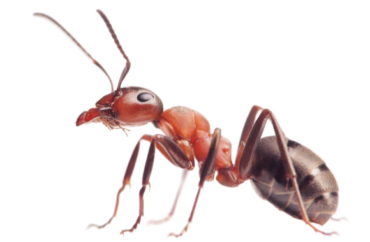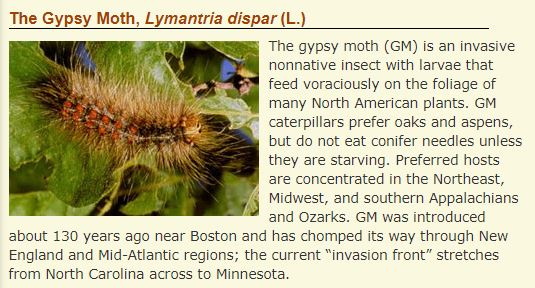
Slavemaker ant. Gypsy moth. Rape bug.
These are just three common English names listed in a spreadsheet of 60 plants and animals that have been recently deemed by some academics to have “problematic” monikers.
Herpetologist and University of Arizona Ph.D. candidate Earyn McGee, a science communicator and lizard enthusiast who runs a popular Twitter profile on her reptile expeditions, told The College Fix when asked about the spreadsheet that “There is no room for racism in science.”
There needs to be honesty about the history of natural resources management and environmentalism in the country, she said, adding there “is no reason to honor racist people or racial slurs by naming animals after them.”
As the American Association for the Advancement of Science reports, the list was inspired “amid protests against racism,” and notes graduate students from around the world contributed to the spreadsheet. It currently lists 60 organisms. (See here and here).
Contributors to the spreadsheet list the organism’s scientific and common names, as well as its kingdom, phylum, class, and order, along with comments in some cases meant to explain why either the common name, or in some cases the scientific name, is offensive or problematic.
Three species in the spreadsheet have the word “Hottentot” in their common names and the Latinized form hottentatus in their scientific names. According to one contributor, “Hottentot is a racial slur used by white people, directed towards indigenous Africans, during apartheid.”
Setophaga townsendi, a species of bird commonly known as Townsend’s Warbler, also appears on the list. The commenter notes only, “John Townsend was terrible.”
John Kirk Townsend was an ornithologist who studied bird species in Oregon. He would often rely on Native Americans to capture his specimens. During his studies, he would describe cultural differences and steal skulls from Indian graves.

The Immigrant Acacia Weevil is also on the list. The note reads, “Related to pest species; can occasionally be a pest. Not really comfortable exterminating something with the word ‘immigrant’ in the name.”
Other offensive animal names include the Large Faggotworm, although the f-word in this case refers to its definition as a bundle of sticks or twigs bound together as fuel.
Also on the list is a type of shield bug called the Rape Bug, as well as the Oriental Rat Flea, a vector for the bubonic plague, which infects rodents. None of these contributors offer additional notes.
While some could arguably be the result of over-thinking or over-sensitivity, others contain serious racial slurs. For example, Maihueniopsis clavarioides is also called the “N***** Finger.” Another, Orsotriaena medus, a dark-colored butterfly, is commonly known as just “the N*****,” according to one student.
Others have also recommended changing names that were created based on erroneous information. Dasymutilla occidentalis has two names: Cow Killer and Velvet Ant. However, it “cannot kill a cow and is not an ant.”
McGee told The College Fix that she hopes to see a change to the name of Yarrow’s Spiny Lizard, which she studies in her field. H. C. Yarrow was a herpetologist who served in the Union Army during the Civil War. But McGee said he was also a eugenicist.
“There is no amount of scientific contributions that can make unabashed racism and bigotry ok,” she said.
You're searching for Yarrow's spiny lizard, Sceloporus jarrovii, (last rt). These lizards can be found in many different microhabitats including on the ground, trees, & rock walls. Can you #FindThatLizard? Let me know in the comments with #FoundThatLizard. Solution is at 9 PM PDT pic.twitter.com/sPqmaQ8LN7
— Dr. Earyn McGee, Lizard lassoer 🦎 (@Afro_Herper) November 7, 2019
In response to a question about whether it is possible to honor people who who made valuable scientific contributions but also held racist beliefs, McGee replied, “If you must acknowledge them, you can say something like ‘X person discovered X thing however it is important to note they also did this bigoted thing and that type of behavior is unacceptable for scientists.’”
She said she hopes that students and other lovers of science will view these people “honestly.”
“They should ask themselves how did those people get into a position to make those contributions in the first place. Whose contributions have been historically ignored to allow this to happen? What oppressive structures allow this?” she said.
Another graduate student who has undertaken a similar campaign is Taylor Tai of the University of Wisconsin-Madison. Tai successfully petitioned the Entomological Society of America to change the name of its annual Linnaean Games, a quiz-bowl-style trivia competition named after Carl Linnaeus.
Known as the Father of Taxonomy, Linnaeus paved the way for the current system of scientific classification. At the same time, the American Association for the Advancement of Science reports he also classified humans (Homo sapiens) based on race, assigning “negative aspects” to people of color.
Tai refused to make a direct comment “[b]ecause The College Fix’s conservative perspective is incompatible with racial justice at its foundation.”
She did, however, refer to a letter which she and other UW students sent to Entomological Society of America. The letter catalogs Linnaeus’ system of racial classification.
“Linnaeus characterized the white Homo sapiens europaeus as wise, lawful, and gentle, while dehumanizing Indigenous (red Homo sapiens americanus), African (black Homo sapiens afer), and Asian (yellow Homo sapiens asiaticus) people with degrading descriptors like ‘obstinate,’ ‘haughty,’ ‘covetous,’ ‘crafty,’ ‘indolent,’ ‘lazy,’ ‘lusty,’ and ‘careless,’” Tai writes.
Tai also mentions that Linnaeus described disabled people as “Homo sapiens monstrosus.”
According to Tai, this is not the first time the Entomological Society of America received calls to change the name of its games.
The society’s members, backed by some outside observers, called for a change in both 2018 and 2019, but its leadership responded by creating task forces and hosting workshops to combat racism.
Tai said that these responses amounted to “side-stepping race to address issues that are more palatable to a predominately white membership.”
“Because an environment that honors Linnaeus is unwelcoming to people of color in the first place, these actions sidestep the needs of many marginalized people in ESA in favor of improving the Society’s diversity optics.”
In addition to the letter, Tai also helped organize a petition to change the name. By the time the Entomological Society of America agreed, the petition had just over 1,500 signatures.
MORE: NYT argues ‘white parents’ main problem with public education system
IMAGES: Main, Andrey Pavlov, Shutterstock / Inside, BBB screenshot and USFS screenshot





Please join the conversation about our stories on Facebook, Twitter, Instagram, Reddit, MeWe, Rumble, Gab, Minds and Gettr.